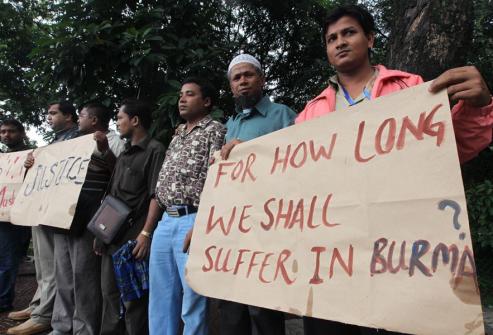
This month marked the 25th anniversary of the 8/8/88 Uprising, a nationwide strike that led to protests across Burma by activists calling for a transition from military rule to democracy. Pro-democracy demonstrations had also taken place earlier that year and led to thousands of deaths at the hands of the military and other security forces. No government official has ever been held accountable for the violence and unlawful arrests. For the first time ever though, President Thein Sein permitted a number of commemorative events in 2013, such as concerts and art shows. However, without acknowledging that abuses had occurred at the hands of the ruling government, and without releasing existing political prisoners, a true commemoration could not occur.
This month also saw significant persecution of the Muslim minority in Burma. For example, police arrested 20 Rohingya on August 9 for performing Eid prayers in Buthidaung. The township and village administrators had forbade anyone from carrying out any kind of prayer on Eid but since it is a significant Muslim holiday, approximately 20 people gathered at a house to pray secretly. During the prayers, police raided and arrested everyone, including children. They were released after being extorted for a large fee but were warned of possible life imprisonment if caught praying again.
Violence in Sittwe also began on August 9, after Hlun Htaine police refused to return the body of a deceased Rohingya man back to his community. Authorities claim that he drowned, though there is evidence that he was physically assaulted prior to death. Police fired into a crowd of Rohingya calling for the return of the body, killing 4 people immediately and injuring 4 more who died at the Bawdupha IDP camp later that evening. Between August 8-11, a total of 9 Rohingya were killed and 10 were injured from gunfire by the Hlun Htaine police. A Rakhine State government spokesman claims that the recent violence was organized by Rohingya who want the international community to believe that the government is neglecting them.
A Rohingya youth was also arrested on August 13 for sharing photos of the recent attack on his Facebook page. Despite his name not being attached to the account, he was identified through the profile picture. He had never engaged in political activity or activism prior to this, but was beaten before being arrested and taken to an unknown location.
There is also increasing evidence that the conflict between Muslims and Buddhists is spilling over to other regions. On August 11, a mosque in Colombo, Sri Lanka was attacked, leaving at least five people injured. A witness said that the Buddhist mob threw stones when the worshippers were performing their evening prayers. This year has seen an increase in violence against mosques and Muslim-owned businesses by Buddhist groups all over Sri Lanka. The violence, however, is not restricted to Buddhist perpetrators and on August 5 the Ekayana Buddhist Centre in Jakarta, Indonesia was bombed. One of the explosive devices had the message “We respond to the screams of Rohingya” written on it.
As many Rohingya seek refuge in places such as Bangladesh, Malaysia, and Thailand, the governments of these countries show indifference to their status in Burma, treating them as illegal immigrants rather than people who are fleeing from religious and ethnic persecution. Over 2,000 Rohingya refugees are being held in detention centres in Thailand alone, where they could remain for months. It was also recently discovered that human traffickers are taking advantage of the marginalized status of the Rohingya by pretending to help the refugees only to then imprison them for ransom or sell them for labour In Thailand. The vulnerability of Rohingya refugees makes them a prime target for traffickers, and this problem is unlikely to change until the situation in Burma improves.
This month, the UN Special Rapporteur on Human Rights in Burma Tomas Ojea Quintana took a trip through Burma to visit IDP camps, meet with leaders from both the Muslim (including Rohingya) and Buddhist communities, and evaluate the government’s observation of human rights standards. During his travels, Quintana was denied requests to visit certain communities and was greeted by protesters who believed that he was biased against Rakhine Buddhists in favour of Rohingya Muslims. Most notably, his convoy was attacked at night by a 200-person Buddhist mob in the town of Meikhtila, where he was examining reconciliation efforts between Rohingya and Buddhists. Quintana holds the Myanmar government responsible for its failure to protect him from these attacks. The government rejected this claim, stating that he was never in real danger and that the crowd only approached him to give him a letter and a t-shirt.
Aid workers are also being targeted on social media websites by anti-Rohingya campaigners, thereby forcing them to quit their jobs. These workers have received threats to both themselves and their families and the intimidation tactics are proving to be a significant challenge for gaining access to various communities which need assistance. The attacks are particularly bad in Rakhine State but are happening all over the country.
This month has show no indication of a slowdown in violence against Rohingya Muslims and, if anything, hatred of Rohingya and indifference to their welfare has only spread further across Burma and neighbouring countries. The treatment of UN Rapporteur Quintana has allowed him to see the true nature of the tensions in the country, and this will hopefully inspire him to further raise the profile of the plight of Rohingya in Burma. However, the tactics being used against aid workers may deter other organizations and agencies from sending further resources to the country. Acts of violence in neighbouring countries also show that the conflict is now crossing borders, meaning that there is potential for more bloodshed. As tensions continue, it appears that Burma may be inching closer to mass atrocities.
Image credit: http://ganashakti.com/bengali/Antarjatik.php?&from=100
